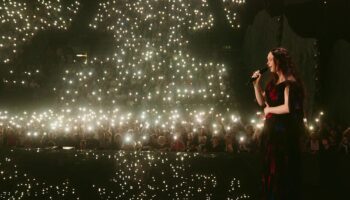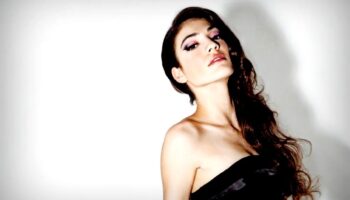Dima Bilan sang Never let you go in 2006 and Believe in 2008.

Díma was born on Christmas Eve 1981 in Ust-Dzheguta, Karachay–Cherkessia, in Russia
He was christened Viktor Belan but, due to various issues with music organisations he legally changed his name to that of the artist we know.
He was noted as a talent from his early days, winning awards including the Young voices of Caucasus.
Spurred on by his success he moved to Moscow and a state musical college called Gnessins. Classical music was the centre of his education.
Like so many artists he had a day time job, working as a shop assistant, while performing at night. He knew that his passion lay outside the classics. Yury Aizenshpis was a major music producer and it was during a musical evening that Dima was spotted as a future music star.
For his first Euroivision in 2006 Channel One decided to select him internally and he headed to Greece with the song Never let you go, coming second.
In 2008 the Russian broadcaster held a national final so Dima had to compete in a field of 27 runners. The song Believe only just won as second placed, Alexandr Panayotov and Crescent and cross, was just two points behind.
Since winning he has continued with his successful career, having numerous singles and albums, winning too many awards to mention
In 2010 Dima produced and starred in the short film Theatre of the Absurd,
In 2012 he duetted in the Russian National Final with Yulia Volkova of t.A.T.u. fame and the song Back to her future. They finished in 2nd place.

The Eurovision Song Contest 2008 was the fifty third edition of the event.
The venue was the Belgrade Arena, located in Novi Beograd, Belgrade, Serbia. The building was opened four years prior to the Eurovision coming to town and has a maximum capacity of 25,000 people. This was a year where the Press Centre was not adjacent to the venue. The Press had to walk a considerable distance between the buildings and so many watched the rehearsals on monitors rather than in front of the artists.
As the rivers Sava and Danube merge in Belgrade the theme of this year was The Confluence of Sound.
Forty three countries took part. San Marino and Azerbaijan made their debut. Austria did not participate with the national broadcaster, ORF, stating that it’s not the quality of the song, but the country of origin that determines the decision. Italy continued their absence and Slovakia cited financial problems.
This was the first year with two semi-finals. The countries for each semi were drawn by lots and seeding to try and make the voting less open to friendly influences. The top nine countries went to the final with the tenth being the choice of the back-up juries. The host, alongside the Big 4, meant that twenty five acts took to the stage during the final.
The two semi finals were won by Greece and Ukraine. In the Final they came third and second respectively with Kalomira singing Secret combination and Ani Lorak performing Shady lady.
The winner was to come from Russia and the singer Dima Bilan, who had come second two years earlier. His song, Believe, was performed on a mini-artificial ice rink, with him being accompanied by Olympic gold medalist and three-time world skating champion Evgeni Plushenko and Hungarian composer and violinist Edvin Marton playing his Stradivarius. The song received seven douze points and four ten points.
Only the top three broke the 200 point barrier with 218, 230 and 272 points for third, second and first place.
Eurovision headed to Moscow for the next edition.
[tps_footer]
Check out our previous Countdown to Eurovision’s Greatest Hits below:
Stay tuned to esctoday.com for Part 5 of our countdown to Eurovision’s Greatest Hits
[/tps_footer]




